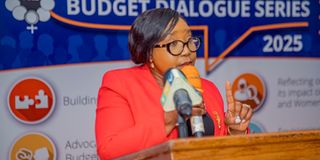Activists urge gender focus in Vision 2050

The Tanzania Gender Networking Programme (TGNP) Executive Director, Ms Lilian Liundi, addresses stakeholders during a gender dialogue held on Friday, April 11, 2025, at the TGNP offices in Dar es Salaam. PHOTO | BEATRICE MATERU
Dar es Salaam. The Tanzania Gender Networking Programme (TGNP) has called for gender equality to be prioritised in the country’s next long-term development agenda, Vision 2050.
Speaking during a gender-responsive budget dialogue held on Friday, April 11, 2025, TGNP brought together stakeholders from civil society, government, academia, and women’s groups.
The stakeholders were convened to review the 2025/26 national budget through a gender lens while reflecting on achievements and remaining gaps of Vision 2025.
The forum, which also sought to shape a more inclusive and equitable Vision 2050, underscored both progress and persisting challenges in gender-responsive budgeting.
TGNP board chairperson, Ms Gema Akilimali, stressed that gender-sensitive budgeting must go beyond symbolic allocations.
“A gender-responsive budget must involve women and marginalised groups at every stage—from planning to implementation,” she said.
Ms Akilimali expressed concern over the gap between budget allocations and actual disbursements, particularly in sectors aimed at empowering women.
“Our role is to ensure institutions are held accountable and that resources are used for their intended purpose,” she added.
TGNP executive director Lilian Liundi echoed the need for systemic reforms: “If Vision 2050 is to be truly inclusive, gender equity must be a non-negotiable foundation.”
“We must ask ourselves: Are women involved in decision-making? Are resources distributed according to the needs of all citizens?” she queried.
Data presented at the dialogue show an increase in women's participation in income-generating activities, from 67 percent in 2000 to 80.2 percent in 2023.
However, stakeholders raised concerns over budget inconsistencies and bureaucratic delays, particularly in accessing the 4-4-2 youth and women empowerment loans drawn from the percentage of council budgets allocated nationwide.
Land ownership among women remains critically low at just eight percent, while the absence of disaggregated data on gender allocations in the national budget continues to undermine transparency.
The Sh57.02 trillion national budget for the 2025/26 financial year includes commitments to gender equity and support for vulnerable groups; however, stakeholders cautioned that underinvestment in key sectors such as trade, industry, and social protection could undermine progress.
Gender economist Makumba Mwemezi has advocated for a centralised approach through the establishment of a National Gender Equality and Women’s Empowerment (GEWE) Plan.
“Gender issues must not be fragmented across sectors. We need a unified national approach aligned with overall development objectives,” he said.
While acknowledging progress in education and water access, Mr Mwemezi pointed to sustainability as a major challenge.
He cited the example of over 148,000 school dropouts recorded in 2023 despite the government’s free education policy.
“In the water sector, access in rural areas has improved to 72 percent, but a third of water sources are non-functional,” he said.
Wajibu Institute’s Karoli Kadenge called for increased investment in social services during the final phase of the Third Five-Year Development Plan (FYDP III).
“To realise inclusive growth, we must strengthen health, education, and water infrastructure. These are the pillars of equity,” he noted.
The forum ended with a resounding call for gender equality to be placed at the heart of national planning and governance as the country transitions from Vision 2025 to Vision 2050.
Participants agreed that women should be recognised not only as beneficiaries but also as leaders and partners in driving Tanzania’s future development.
TGNP and its partners reaffirmed their commitment to promoting transparency, accountability, and gender equity in all development processes.




